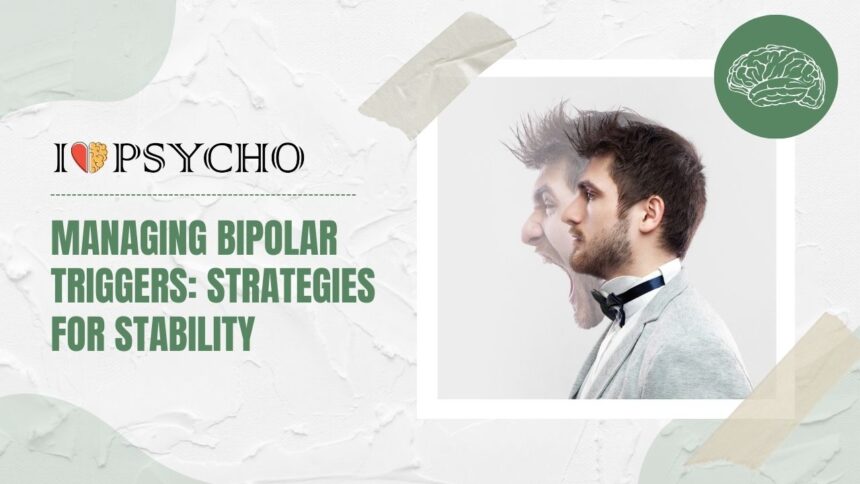Welcome to a guide on managing bipolar triggers and finding stability in your life. Living with bipolar disorder can present unique challenges, especially when it comes to navigating the various triggers that can disrupt your mental health. By understanding these triggers, implementing effective strategies, and prioritizing self-care, you can empower yourself to lead a more balanced and fulfilling life. Let’s dive into practical tips and insights that can help you take control of your well-being and thrive despite the ups and downs of bipolar disorder.
Understanding Bipolar Disorder and Triggers
Bipolar disorder is a complex mental health condition characterized by extreme mood swings. Individuals with bipolar disorder experience periods of intense highs (mania) and lows (depression). These mood shifts can be triggered by various factors, known as triggers. Triggers are specific events or situations that can worsen symptoms or lead to mood episodes. Understanding your unique triggers is crucial in managing bipolar disorder effectively. By recognizing patterns in your moods and behaviors, you can identify what influences these fluctuations.
Common triggers for individuals with bipolar disorder include stress, lack of sleep, substance abuse, significant life changes, and disruptions in routine. It’s essential to remember that triggers vary from person to person; what affects one individual may not impact another in the same way. By gaining insight into how certain factors influence your mental well-being, you can proactively address them and minimize their negative effects on your mood stability.
Identifying Your Personal Triggers
Identifying your personal triggers is a crucial step in managing bipolar disorder effectively. Triggers can vary greatly from person to person, so taking the time to reflect on what specifically sets off mood swings or episodes for you is essential. It could be stress from work or relationships, disrupted sleep patterns, substance abuse, or even certain environmental factors.
Keep a journal to track your moods and behaviors when you feel triggered. Look for patterns and commonalities that may point towards specific triggers. Pay attention to how different situations make you feel and any physical symptoms that accompany them.
Discuss your observations with your healthcare provider or therapist. They can help you identify potential triggers and develop strategies to cope with them proactively. Remember, identifying triggers is not about placing blame but about gaining self-awareness and empowerment in managing your mental health effectively.
Strategies for Managing Triggers:
Living with bipolar disorder can present unique challenges, especially when it comes to managing triggers that can disrupt stability. Fortunately, there are various strategies that individuals can incorporate into their daily routine to help navigate these triggers effectively.
Medication management is a crucial aspect of treatment for bipolar disorder. Working closely with healthcare providers to find the right medication and dosage can significantly reduce the impact of triggers on mood swings.
Therapy and counseling provide a safe space for individuals to explore their emotions and develop coping mechanisms. Cognitive-behavioral therapy, in particular, has been shown to be beneficial in identifying and addressing trigger points.
Lifestyle changes such as maintaining a regular sleep schedule, engaging in physical activity, and avoiding alcohol or drugs can also play a significant role in managing triggers. These small adjustments can make a big difference in overall stability.
Incorporating mindfulness practices into daily life, such as meditation or deep breathing exercises, can help individuals stay grounded during trigger situations. Being present in the moment allows for better self-awareness and emotional regulation.
A. Medication Management
Medication management is a crucial aspect of managing bipolar disorder. It involves finding the right balance and combination of medications that work best for you. Consulting with a psychiatrist or healthcare provider to discuss your symptoms and treatment options is essential.
It’s important to take your medication as prescribed and not make any changes without consulting your healthcare provider first. Some medications may have side effects, but it’s vital to communicate any concerns you have so adjustments can be made if necessary.
Consistency in taking your medication is key for its effectiveness. Setting reminders or incorporating it into your daily routine can help ensure you don’t miss doses.
Remember, medication alone may not be sufficient for managing bipolar disorder. It often works best when combined with therapy, lifestyle changes, and support from loved ones.
B. Therapy and Counseling
Therapy and counseling play a crucial role in managing bipolar triggers. It provides a safe space to explore your emotions, thoughts, and behaviors. A therapist can help you identify patterns and develop coping strategies tailored to your needs.
Through therapy, you can gain valuable insights into your triggers and learn effective ways to manage them. Cognitive-behavioral therapy (CBT) is particularly beneficial for individuals with bipolar disorder as it focuses on changing negative thought patterns.
Additionally, interpersonal therapy can improve relationships and communication skills, reducing stressors that may trigger episodes. Group therapy offers support from peers who understand what you’re going through.
Regular sessions with a qualified therapist can enhance self-awareness and resilience in the face of triggers. Remember, seeking help is a sign of strength, not weakness!
C. Lifestyle Changes
Making lifestyle changes can greatly impact your stability when managing bipolar triggers. Establishing a daily routine that includes regular sleep patterns, exercise, and healthy meals can help regulate your mood. Engaging in activities that bring you joy and relaxation, such as hobbies or spending time outdoors, can also contribute to overall well-being.
Limiting alcohol and drug use is essential as these substances can worsen bipolar symptoms. Surround yourself with positive influences by building supportive relationships with friends and family members who understand your condition. Setting boundaries and learning to say no to additional stressors are crucial for maintaining balance in your life.
Exploring mindfulness practices like yoga or meditation can help you stay grounded during challenging times. Finding ways to manage stress through relaxation techniques or therapy can also be beneficial in preventing triggers from escalating. Remember, small lifestyle changes can lead to significant improvements in managing bipolar disorder effectively.
D. Mindfulness Practices
Mindfulness practices can be a powerful tool in managing bipolar triggers. By bringing your attention to the present moment without judgment, you can cultivate awareness of your thoughts and emotions. This heightened self-awareness allows you to recognize when you are being triggered before it escalates.
Engaging in mindfulness activities such as meditation, deep breathing exercises, or yoga can help calm the mind and regulate emotions. These practices provide a sense of grounding and stability during turbulent times.
By incorporating mindfulness into your daily routine, you build resilience against triggers and create a buffer between external stressors and your emotional responses. It’s about learning to observe your thoughts without getting entangled in them.
Remember that practicing mindfulness is a skill that takes time to develop. Be patient with yourself and approach it with an open mind. The more you integrate these practices into your life, the better equipped you’ll be to navigate trigger situations with clarity and composure.
Building a Support System
Building a support system is crucial when managing bipolar disorder. It’s essential to surround yourself with understanding and compassionate individuals who can provide emotional support when needed. Friends, family members, therapists, or support groups can all play a vital role in your journey towards stability.
Open up to those you trust about your struggles and let them know how they can best support you during difficult times. Communication is key in building strong relationships that foster a sense of security and comfort.
Having people you can rely on for encouragement and guidance can make a significant difference in how effectively you manage triggers and symptoms associated with bipolar disorder. Remember, it’s okay to lean on others for help – no one should have to face this alone.
Planning Ahead for Trigger Situations
Life with bipolar disorder can be unpredictable, but planning ahead for trigger situations can help maintain stability. It’s essential to recognize patterns and potential triggers that may lead to mood episodes. By identifying these triggers proactively, individuals can take steps to prevent or lessen their impact.
Creating a plan of action for when triggers arise is key. This could involve establishing coping mechanisms, reaching out to a support system, or having a list of resources readily available. Developing strategies in advance can make it easier to navigate challenging situations when they occur.
Having open communication with loved ones about trigger situations is crucial. They can offer support and assistance in implementing the planned strategies when needed. Additionally, discussing trigger management techniques with healthcare providers ensures a comprehensive approach to maintaining mental health stability.
Remember, being prepared doesn’t guarantee complete avoidance of triggers, but it does empower individuals to face them head-on with confidence and resilience.
Coping with Relapses
Coping with relapses in bipolar disorder can be challenging. It’s important to remember that setbacks are a natural part of the journey towards stability. When facing a relapse, it’s crucial to reach out for support from loved ones or mental health professionals.
One helpful strategy is to revisit coping mechanisms that have worked in the past. This could include practicing mindfulness exercises, engaging in self-care activities, or adjusting medication as prescribed by your healthcare provider.
It’s also essential to stay consistent with therapy and counseling sessions during times of relapse. These resources can provide valuable tools for managing symptoms and navigating difficult emotions.
Remember, it’s okay to ask for help when needed and prioritize your well-being above all else. Coping with relapses requires patience, self-compassion, and a willingness to adapt strategies as necessary.
Staying Consistent with Treatment
Consistency is key when it comes to managing bipolar disorder. It’s important to stay committed to your treatment plan, even when you’re feeling stable. This means taking your medication as prescribed and attending therapy sessions regularly.
Set reminders or alarms to help you remember to take your medication on time. Keep track of your appointments and make them a priority in your schedule. Communicate openly with your healthcare provider about any concerns or changes in symptoms.
Don’t be discouraged if you experience setbacks along the way. Recovery is a journey with ups and downs, but staying consistent with treatment can help minimize the impact of relapses.
Find support from loved ones who can encourage you to stay on track with your treatment plan. Remember that taking care of yourself is a proactive step towards maintaining stability in managing bipolar disorder.
The Importance of Self-Care
Self-care is a crucial aspect of managing bipolar disorder. It involves taking the time to nurture your physical, emotional, and mental well-being. This can include activities like getting enough sleep, eating nutritious meals, exercising regularly, and practicing relaxation techniques.
Engaging in self-care practices can help reduce stress levels and improve overall mood stability. It allows you to prioritize your needs and recharge your energy reserves. Self-care also involves setting boundaries with others and learning to say no when necessary.
Remember that self-care looks different for everyone, so it’s essential to find what works best for you individually. Whether it’s spending time outdoors, journaling, or engaging in hobbies that bring you joy – make sure to incorporate these activities into your daily routine.
By prioritizing self-care, you are investing in your mental health and well-being. So take the time to care for yourself because you deserve it!
Conclusion
Managing bipolar disorder triggers requires a proactive approach that combines medication management, therapy, lifestyle changes, mindfulness practices, and building a strong support system. By identifying personal triggers, planning ahead for trigger situations, coping with relapses, staying consistent with treatment, and prioritizing self-care, individuals can strive towards stability and improved quality of life. Remember that everyone’s journey with bipolar disorder is unique, so it’s essential to find what works best for you in managing your triggers. With dedication and the right strategies in place, stability is achievable.









